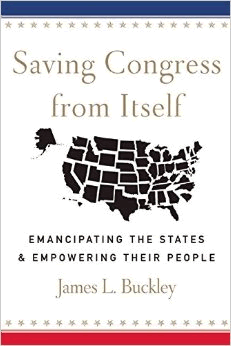Saving Congress from Itself: Emancipating the States and Empowering Their People - Podcast
Federalism & Separation of Powers Practice Group Podcast
 In his recent book, Saving Congress from Itself: Emancipating the States and Empowering Their People, former Senator James Buckley eloquently contends that our federal system of government has been systematically undermined by the practice of Congress intruding on matters the Constitution reserves to the States. While Senator Buckley recognizes the inevitability of competition between state and federal politicians to be seen as solving important problems for constituents, he contends that without the federal judiciary keeping federal lawmakers within constitutional bounds, they face strong, likely irresistible, incentives to use federal taxpayer dollars to benefit home states and districts. Senator Buckley laments above all the Supreme Court’s 1937 Spending Clause decision in Steward Machine Company v. Davis. The whole problem with Steward Machine Company, according to Senator Buckley, is its holding that “in its pursuit of the general welfare, Congress is authorized to provide states with funds to implement programs that Congress itself has no power to write into law.”
In his recent book, Saving Congress from Itself: Emancipating the States and Empowering Their People, former Senator James Buckley eloquently contends that our federal system of government has been systematically undermined by the practice of Congress intruding on matters the Constitution reserves to the States. While Senator Buckley recognizes the inevitability of competition between state and federal politicians to be seen as solving important problems for constituents, he contends that without the federal judiciary keeping federal lawmakers within constitutional bounds, they face strong, likely irresistible, incentives to use federal taxpayer dollars to benefit home states and districts. Senator Buckley laments above all the Supreme Court’s 1937 Spending Clause decision in Steward Machine Company v. Davis. The whole problem with Steward Machine Company, according to Senator Buckley, is its holding that “in its pursuit of the general welfare, Congress is authorized to provide states with funds to implement programs that Congress itself has no power to write into law.”
As the culmination of his analysis, Senator Buckley offers a “modest” proposal: that “Congress immediately terminate all federal programs that offer grants to states and their subdivisions.” Acknowledging that federal grants currently constitute more than 30% of state revenues, and hence Congress cannot cut off the flood of federal money overnight, Senator Buckley specifically proposes that Congress “terminate the grants by converting them into single no-strings-attached block grants --- one for each state” and then subsequently phase out these block grants over a period of years.
- Hon. James L. Buckley, U.S. Court of Appeals for the D.C. Circuit (ret.) and former U.S. Senator
- Interviewer: Robert R. Gasaway, Partner, Kirkland & Ellis LLP






